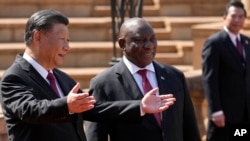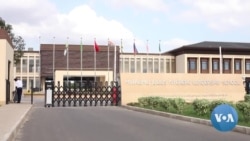Political analysts and opposition politicians in Africa accuse China of undermining the spread of democracy in the region by propping up entrenched ruling parties and promoting what Beijing sees as the advantages of one-party rule.
The beneficiaries in many cases are former liberation movements that won struggles against colonial and white-minority rule decades ago, often with Chinese support. Now organized as governing political parties, they have stayed in power ever since, often while accused of stifling any opposition.
A major instrument of Chinese influence is a $40 million political training school based in Tanzania and jointly established last year by the Chinese Communist Party (CCP) and six southern African former liberation movements.
Each of the six nations participating in the school — Tanzania, Namibia, South Africa, Zimbabwe, Mozambique and Angola — has been ruled by the same party since independence.
Promoting 'weiwen'
“The CCP capitalized on an opportunity to relocate some of its political and ideological programs to Africa,” China-Africa scholar Paul Nantulya said of the school in a recently published paper for the Africa Center for Strategic Studies.
“The six FLMSA parties are focused on supporting one another to preserve their rule against perceived threats,” Nantulya explained. “The CCP term for this is 'weiwen,' meaning 'stability maintenance' or 'regime survival.'
“The Nyerere Leadership School is the first political school the CCP has built overseas, a bold move by a party that often denies that it promotes its political system abroad. The school enables the CCP to proselytize and methodically share its governance model,” Nantulya continued.
“The CCP hopes to gain a return on investment as the school gives it a permanent home for year-round interactions with each party’s new recruits and senior party cadres. This puts it in an advantageous position to shape the African liberation parties’ China friendly policies and long-term influence.”
China’s position
China denies it plays a role in keeping ruling parties in power.
“We don’t interfere in the African countries’ pursuit for a development path that fits their national conditions. We don’t interfere, nor impose our own will on Africa,” wrote Liu Pengyu, spokesperson for the Chinese Embassy in Washington in response to VOA’s inquiry.
VOA also asked whether China engages equally with political opposition parties in Africa.
“When it comes to party-to-party relationship, the Communist Party of China is ready to deepen interactions with political parties and organizations of all countries, including those in Africa. We seek shared views and expand shared interests,” Liu said.
The United States also provides training in its model of governance to foreign political parties through the congressionally funded National Endowment for Democracy, whose website says it is dedicated to fostering democratic institutions “including political parties, trade unions, free markets and business organizations” while supporting "human rights, an independent media, and the rule of law.”
But China itself is a one-party state, and Ray Hartley, research director of the Brenthurst Foundation, a Johannesburg-based policy think tank, said the Tanzania school's existence is problematic.
"It is concerning that this particular school is for leaders of selected 'liberation movements' only, especially since it teaches the doctrine that the party must be all powerful and trump the judiciary."
"In Zimbabwe, Mozambique, Angola and Tanzania, these liberation movement governments have been in power for decades and have not hesitated to undercut democratic processes to keep it that way," Hartley added.
Ruling party and the opposition
With some notable exceptions such as South Africa’s African National Congress party, Nantulya said many former liberation parties “have been largely intolerant of opposition challenges and have employed wide ranging measures to stifle, constrain and even dismantle opposition parties.”
One example is Zimbabwe, which has been governed by former liberation movement ZANU-PF since 1980, and whose elections this year were marred by widespread irregularities, according to observers.
While many Western nations expressed concern over the Zimbabwean polls, Beijing congratulated the winner, the ruling party’s President Emmerson Mnangagwa.
“It's a cause for concern for us in Zimbabwe and in Africa in general especially in view of the ‘no questions asked’ policy on the Chinese in their engagement with Africa, their tendency to view Africa as a dumping site and of course undermining human rights democracy transparency in favor of errant regimes,” said Promise Mkwananzi, spokesperson for Zimbabwe’s main opposition party, the Citizen’s Coalition for Change (CCC).
His party’s members have been jailed, tortured and killed while mounting a challenge to the regime.
“It leaves opposition parties with no choice but to question the motives of the CCP in Africa. We believe that the CCP must have principled, non-partisan approaches to African countries and not blindly side and even aid ruling parties to rig elections violate human rights and undermine democratic entrenchment in Africa,” Mkwananzi added.
Zimbabwe’s governing party, ZANU-PF did not respond to a request for comment.
Change of guard?
However, historical friendships don't mean China isn't able to adapt to changes on the continent when necessary.
What happens to a ruling party when it loses an election or is removed from power is telling, Nantulya told VOA. He uses Zambia as an example, because it has had several changes of power and its former liberation movement lost to the opposition again in 2021 polls.
Zambia’s former liberation party is not part of the leadership academy in Tanzania, and Nantulya noted, “I think the Communist Party of China does not want to embarrass or complicate its relationship with Zambia. It has a policy of cultivating whoever is in office.”
He points to the fact that the CCP has been wooing new Zambian leader Hakainde Hichilema.
Likewise, in some countries in Africa, where things are less stable or specific political parties are less securely entrenched, Nantulya noted Beijing does cultivate relationships across the political spectrum, giving the examples of Kenya and the Democratic Republic of Congo.
However, it’s different “when a political party program is only training ruling parties and helping them to entrench their stay in office,” he said.







